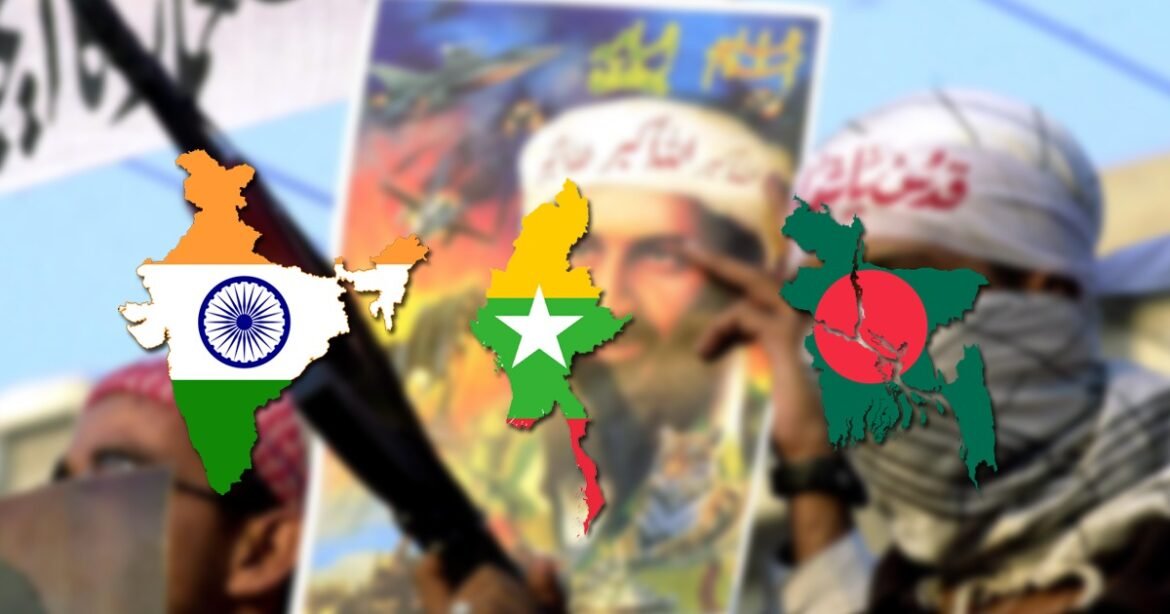A report from the United Nations Security Council divulges Al-Qaeda is training its regional offshoot in preparation for expanding its terror activities in the Indian subcontinent, including Bangladesh, the Indian state of Jammu and Kashmir and Myanmar.
Al-Qaeda’s efforts to expand operations in the Indian subcontinent have been highlighted in a recent report by the United Nations. The 32nd report of the Analytical Support and Sanctions Monitoring Team revealed that Al-Qaeda is actively encouraging its regional affiliate, Al-Qaeda in the Indian Subcontinent (AQIS), to expand its operations into Bangladesh, Jammu and Kashmir, and Myanmar.
You can also read: CEC’s Confidential Meeting with Chief Justice and High-Level Talks with Foreign Delegates
AQIS, led by its emir Osama Mehmood, reportedly consists of approximately 200 fighters. According to one Member State’s assessment, Al-Qaida is actively strategizing to expand its operations into neighboring countries, including Bangladesh, Indian-Administered Jammu and Kashmir, and Myanmar. That Member State also noted that certain limited elements of AQIS are ready to either join or collaborate with ISIL-K.
The report reveals Afghanistan remains a significant stronghold for Al-Qaeda, housing 30 to 60 core members and 400 fighters. The country serves as an ideological and logistical hub for the group, aiding in recruitment and rebuilding external operations capability. Moreover, the Taliban and Al-Qaeda maintain a close and beneficial relationship, with some Taliban officials allegedly supporting Al-Qaeda members’ infiltration into law enforcement and public administration agencies.
“Under the patronage of high-ranking officials of the de-facto Taliban authorities, Al-Qaida members infiltrate law enforcement agencies and public administration bodies, ensuring the security of Al-Qaida cells dispersed throughout the country,” it said.
Al-Qaeda’s future and potential regional threats
There are concerns that Tehreek-e-Taliban Pakistan (TTP) could become a regional threat if it maintains a secure base in Afghanistan. One member state even suggested a merger between AQIS and TTP. The Taliban Tehreek-e-Taliban Pakistan (TTP) reportedly receives guidance from al-Qaeda in the Islamic Maghreb (AQIS) for conducting more attacks within Pakistan. Furthermore, ETIM/TIP reportedly used training facilities in Kunar Province, Afghanistan, for TTP fighters.
The UN report highlights the challenges posed by the regional terrorist landscape. Alongside Al-Qaeda, it identifies the Islamic State of Iraq and the Levant-Khorasan (ISIL-K) as a significant concern. ISIL-K, including family affiliates, is estimated to have between 4,000 and 6,000 members and has launched sophisticated attacks against both the Taliban and international targets. The operational capabilities and recruitment efforts of the group.
India, Jammu and Kashmir, Bangladesh, and Myanmar are on high alert in response to the increasing influence and activities of Al-Qaeda in the region. The potential for these extremist groups to unite under the TTP’s umbrella could make the Taliban difficult to control. Al-Qaeda’s capacity to conduct large-scale terror attacks remains diminished, but the organization’s intent remains unchanged.
What’s with Bangladesh?
Since 2013, Bangladesh has been grappling with a series of militant attacks and killings attributed to Al-Qaeda. The law enforcement agencies of Bangladesh have consistently claimed that these incidents were carried out by domestic extremists. In 2014, an audio message called for “jihad against the enemies of Islam” in the creation of Bangladesh. That same year, another audio message announced Al-Qaeda’s intent to establish its Indian branch and operate in Bangladesh.
Another international terrorist group, ISIS, claimed responsibility for several attacks, including the Gulshan attack in 2016, known as the Holey Artisan Bakery attack. In this attack, 22 people were killed, including 17 foreigners. The attackers were believed to be affiliated with AQIS, and the incident shocked the nation and the international community.
Apart from that, there have been reports of AQIS activities and affiliations with local extremist groups in Bangladesh. They also proclaimed the existence of a separate “Khilafat” in Bangladesh, announcing the name of their leader. However, over the past few years, the determined actions of law enforcement agencies have effectively curbed the activities of extremist groups in the country, especially after the Gulshan cafe attack.
The Bangladeshi authorities have been vigilant in countering terrorism and have conducted several counter-terrorism operations to combat AQIS and other terrorist threats. However, the Jamaat-e-Islami has returned to politics after a long time before elections and gathering funds from affiliated groups like ICNA Relief, Helping Hand for Relief and Development, AQIS etc. The return of Jamaat has reportedly sparked the chances of a strengthened alliance with AQIS and terrorist activities in the country.
A recent report released on Global Terrorism Index 2023 showed that Bangladesh has been performing better than India, Pakistan and the USA in combatting terrorism. While Bangladesh has been one of the most effective nations in combating terrorism since 2016, and the country has steadily risen in the rankings each year, the UN report on the rising influence of terrorist groups like AQIS, puts the country in a security concern.
Moreover, The US sanctions on Bangladesh’s Rapid Action Battalion (RAB) may have the potential to exacerbate the terror situation in the country. The country has been working diligently to combat terrorism and has made significant strides in countering extremist groups. However, the US sanctions on RAB could undermine the country’s efforts and affect its ability to effectively tackle terrorism.
Furthermore, the imposition of sanctions on a key security force like RAB could disrupt its operations and capabilities, potentially creating a security vacuum that terrorist groups could exploit. The weakening of RAB’s effectiveness in combating terrorism may embolden extremist elements and lead to an increase in terrorist activities in the country.
To conclude, the growing influence of Al-Qaeda in the Indian subcontinent, including Bangladesh, presents significant terrorism risks for the country. The recent UN report highlights Al-Qaeda’s efforts to expand operations in Bangladesh, Jammu and Kashmir, and Myanmar through its regional affiliate, AQIS. Bangladesh has been grappling with extremist activities since the early 2000s, and the government’s efforts to counter terrorism have shown positive results. However, the resurgence of Jamaat-e-Islami and US sanctions on RAB may undermine these efforts and create security challenges.


